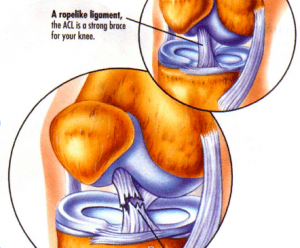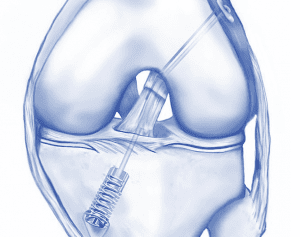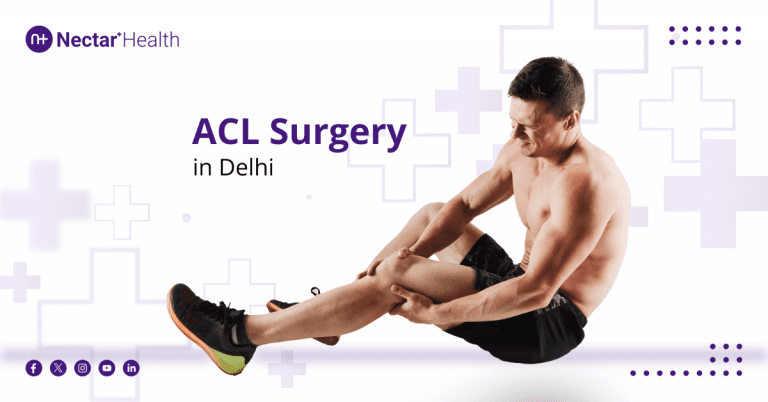In the vibrant heart of Delhi, where ancient history meets modern-day dynamism, a mishap can turn your world upside down. Such is the fate of those who suffer ACL (Anterior Cruciate Ligament) injuries, often caused by sports activities, accidents, or wear and tear. In this in-depth guide, we’ll delve into the world of ACL surgery in Delhi, shedding light on various procedures, costs, and answering the most frequently asked questions to ensure you’re well-prepared for your journey to recovery.
Introduction to Anterior Cruciate Ligament (ACL):

The anterior cruciate ligament (ACL) is one of the four major ligaments in the knee. It helps to stabilize the joint and prevent the shinbone from sliding out in front of the thighbone. An ACL tear is a common sports injury, especially among athletes who participate in sports such as cricket, badminton, basketball, soccer, and skiing.
ACL surgery is a procedure to repair or replace a torn ACL. It is a minimally invasive surgery that is performed using an arthroscope, a small camera inserted into the knee joint through a small incision. The surgeon then makes additional small incisions to insert the surgical instruments.
ACL surgery is usually recommended for active people who want to return to their pre-injury level of activity. It is also recommended for people who have other knee injuries, such as a torn meniscus, that are causing instability.
Understanding ACL Tears and Injuries
Before delving into the world of ACL surgery, it’s essential to grasp what an ACL tear or injury is. The ACL, or anterior cruciate ligament, is a crucial ligament that stabilizes your knee joint. Tears in the ACL often occur due to sports injuries, sudden twists, or excessive stress on the knee.
The Importance of ACL Surgery

When an ACL tear occurs, it can be extremely painful and limit your range of motion. ACL surgery becomes a critical intervention to restore stability and function to the knee. It can prevent further damage, protect other knee structures, and help you regain an active lifestyle. ACL surgery emerges as a life-changing intervention when faced with an ACL tear. It offers the promise of restoring stability and mobility to your knee, thereby facilitating your return to an active lifestyle. This section sheds light on the significance of ACL surgery.
Types of ACL Surgery Procedures
The anterior cruciate ligament (ACL) is a ligament that stabilizes the knee joint. An ACL tear is a common injury, especially among athletes. ACL tears can be partial or complete. Partial ACL tears may heal on their own with physical therapy. However, complete ACL tears typically require surgery to repair.
Types of ACL surgery
There are several different types of ACL surgery. The most common type of ACL surgery is arthroscopic ACL reconstruction. In this procedure, the surgeon uses a small camera and surgical instruments inserted through small incisions in the knee to repair the ACL.
During arthroscopic ACL reconstruction, the surgeon will first remove the torn ACL tissue. Then, the surgeon will create a new ACL from a piece of tendon, such as the hamstring tendon or patellar tendon. The new ACL will be secured in place using screws or staples.
Other types of ACL surgery include:
- Open ACL surgery: Open ACL surgery is performed through a larger incision in the knee. This type of surgery is typically only performed if the surgeon is unable to visualize the knee joint properly or if there is other damage to the knee joint that needs to be repaired.
- Two-stage ACL surgery: Two-stage ACL surgery is an option for patients with partial ACL tears. In this procedure, the surgeon will first repair the torn ACL tissue. After the tissue has healed, the surgeon will perform a second surgery to create a new ACL from a piece of tendon.
- ACL revision surgery: ACL revision surgery is an option for patients who have had a previous ACL surgery that has failed. In this procedure, the surgeon will remove the failed graft and create a new ACL from a piece of tendon.
Choosing the right type of ACL surgery
The best type of ACL surgery for you will depend on the severity of your injury and your individual needs. Be sure to talk to your doctor to discuss your options and choose the procedure that is right for you.
Recovery from ACL surgery
Types of ACL Grafts:
There are two main types of ACL surgery:
- Autograft: This involves using a tendon from another part of the body, such as the hamstring or patellar tendon, to replace the torn ACL.
- Allograft: This involves using a tendon from a donor to replace the torn ACL.
The type of ACL surgery that is best for you will depend on your individual circumstances. Your surgeon will discuss the options with you and help you make the best decision.
Different types of Screws used in ACL Surgery
There are several different types of screws that can be used for ACL surgery. The most common types of screws include:
- Titanium screws: Titanium screws are strong and durable, and they are resistant to corrosion.
- Bioabsorbable screws: Bioabsorbable screws are made from materials that are naturally absorbed by the body over time. This eliminates the need for a second surgery to remove the screws.
- Interference screws: Interference screws are designed to press into the bone and create a tight fit. This helps to prevent the screw from loosening or breaking.
The type of screw that your surgeon chooses will depend on a number of factors, including:
- The type of ACL surgery you are having
- The quality of your bone
- Your individual needs and preferences
Titanium screws
Titanium screws are the most commonly used type of screw for ACL surgery. They are strong and durable, and they are resistant to corrosion. Titanium screws are also biocompatible, meaning that they are unlikely to cause an allergic reaction.
Bioabsorbable screws
Bioabsorbable screws are made from materials that are naturally absorbed by the body over time. This eliminates the need for a second surgery to remove the screws. Bioabsorbable screws are often used for pediatric ACL surgery, as children’s bones are still growing.
Interference screws
Interference screws are designed to press into the bone and create a tight fit. This helps to prevent the screw from loosening or breaking. Interference screws are often used for ACL surgery in athletes, as they are less likely to loosen during strenuous activity.
Other types of screws
Other types of screws that may be used for ACL surgery include:
- Cross-pin screws: Cross-pin screws are used to secure the ACL graft to the bone.
- Suspensory screws: Suspensory screws are used to support the ACL graft and prevent it from stretching.
The best type of screw for you will depend on the specific needs of your surgery and your overall health. Be sure to talk to your doctor about the best type of screw for you.
Cost of ACL Surgery in Delhi
The cost of ACL surgery in Delhi varies depending on a number of factors, including the type of surgery performed, the surgeon’s experience, and the hospital or clinic where the surgery is performed.
Average cost of ACL surgery in Delhi
The average cost of ACL surgery in Delhi ranges from Rs. 45,000 to Rs. 3,86,000. However, the cost can vary significantly depending on the factors mentioned above.
Treatment Type | Minimum Cost | Maximum Cost | Average Cost |
Arthroscopic ACL Reconstruction | 1,24,500 | 3,00,000 | 1,50,000 |
Open ACL Reconstruction | 1,10,000 | 2,00,000 | 1,25,000 |
Minimally Invasive ACL Reconstruction | 1,20,000 | 3,50,000 | 2,00,000 |
ACL Surgery Cost in Delhi Areas
| Area | ACL Surgery Cost (INR) |
|---|---|
| ACL Surgery cost in Vasant Vihar | ₹55,000 – ₹230,000 |
| ACL Surgery cost in Greater Kailash | ₹49,000 – ₹245,000 |
| ACL Surgery cost in Green Park | ₹48,000 – ₹225,000 |
| ACL Surgery cost in Safdarjung Development Area | ₹52,000 – ₹255,000 |
| ACL Surgery cost in Hauz Khas | ₹47,000 – ₹215,000 |
| ACL Surgery cost in Malviya Nagar | ₹46,000 – ₹200,000 |
| ACL Surgery cost in Panchsheel Park | ₹54,000 – ₹240,000 |
| ACL Surgery cost in Defence Colony | ₹58,000 – ₹260,000 |
| ACL Surgery cost in Lajpat Nagar | ₹51,000 – ₹220,000 |
| ACL Surgery cost in Nehru Place | ₹45,000 – ₹195,000 |
| ACL Surgery cost in Connaught Place | ₹53,000 – ₹235,000 |
| ACL Surgery cost in Hauz Khas Enclave | ₹60,000 – ₹270,000 |
| ACL Surgery cost in Saket | ₹57,000 – ₹250,000 |
| ACL Surgery cost in Dwarka | ₹49,000 – ₹210,000 |
Cost breakdown of ACL surgery in Delhi
The cost of ACL surgery in Delhi can be broken down into the following components:
- Surgeon’s fees: The surgeon’s fees are the largest component of the cost of ACL surgery. Surgeon’s fees vary depending on the surgeon’s experience and reputation.
- Hospital or clinic fees: The hospital or clinic fees cover the cost of using the operating room, anesthesia, and other medical services. Hospital or clinic fees vary depending on the type of hospital or clinic where the surgery is performed.
- Anesthesia fees: The anesthesia fees cover the cost of the anesthesia services provided during the surgery. Anesthesia fees vary depending on the type of anesthesia used and the length of the surgery.
- Medical supplies: The cost of medical supplies includes the cost of the ACL graft, screws, and other materials used during the surgery.
- Post-operative care: The cost of post-operative care includes the cost of physical therapy and other services needed after the surgery.
Factors that affect the cost of ACL surgery in Delhi
The following factors can affect the cost of ACL surgery in Delhi:
- Type of surgery: The type of ACL surgery performed will affect the cost of the surgery. Arthroscopic ACL surgery is the most common type of ACL surgery and is also the least expensive. Open ACL surgery is more invasive and more expensive than arthroscopic ACL surgery.
- Surgeon’s experience: The surgeon’s experience will also affect the cost of the surgery. More experienced surgeons typically charge higher fees.
- Hospital or clinic: The type of hospital or clinic where the surgery is performed will also affect the cost of the surgery. Private hospitals and clinics typically charge higher fees than public hospitals and clinics.
- Location: The location where the surgery is performed can also affect the cost of the surgery. ACL surgery performed in major cities like Delhi is typically more expensive than ACL surgery performed in smaller towns and cities.
Is it 100% Success rate of ACL Surgery in Delhi?
ACL surgery is a common surgical procedure to repair a torn anterior cruciate ligament (ACL). The ACL is a ligament that helps to stabilize the knee joint. ACL tears are often caused by sports injuries, such as pivoting or landing awkwardly.
The success rate of ACL surgery is very high, with over 95% of patients able to return to their normal activities and sports without any further problems. The success rate of ACL surgery in Delhi is particularly high due to a number of factors, including:
- The experience and expertise of the surgeons in Delhi: Delhi has some of the most experienced and skilled ACL surgeons in the world. These surgeons have performed thousands of ACL surgeries and have a deep understanding of the latest surgical techniques and procedures.
- The use of advanced surgical techniques: Delhi hospitals use the most advanced surgical techniques for ACL surgery, such as arthroscopic ACL reconstruction. Arthroscopic ACL reconstruction is a minimally invasive procedure that results in faster recovery times and less pain.
- The availability of high-quality medical facilities: Delhi hospitals have some of the best medical facilities in the world, with state-of-the-art equipment and experienced medical staff. This ensures that patients receive the best possible care both during and after surgery.
In addition to the factors mentioned above, the success rate of ACL surgery in Delhi is also influenced by the patient’s own individual factors, such as their age, activity level, and overall health. Patients who are younger, more active, and in better overall health tend to have better outcomes from ACL surgery.
What can patients do to improve their chances of success after ACL surgery?
There are a number of things that patients can do to improve their chances of success after ACL surgery, including:
- Following their doctor’s instructions carefully: It is important to follow your doctor’s instructions carefully after surgery, including taking your medications as prescribed and attending all physical therapy appointments.
- Rehabilitating properly: Rehabilitation is essential for a successful recovery from ACL surgery. Physical therapy will help you to regain range of motion, strength, and stability in your knee.
- Being patient: It takes time to recover from ACL surgery. It is important to be patient and to not push yourself too hard during recovery.
If you are considering ACL surgery in Delhi, be sure to talk to your doctor about the success rate of ACL surgery in Delhi and what you can do to improve your chances of success after surgery.
ACL Tears and Their Impact
In our journey to uncover the world of ACL surgery, let’s first understand what an ACL tear entails. The anterior cruciate ligament is a critical structure in the knee joint that maintains stability. Tears in this ligament can result in pain, swelling, and, more importantly, hinder your ability to walk or engage in physical activities.
ACL Surgery Without Surgery: Is It Possible?
While ACL surgery is a standard treatment, some individuals may opt for non-surgical approaches, particularly in cases of partial ACL tears or when surgery is not recommended. We explore the options and their effectiveness.
What to Expect Before ACL Surgery
Before undergoing ACL surgery, a thorough assessment is conducted to evaluate the extent of the injury and the best-suited surgical approach. Pre-operative preparations will include discussions with your surgeon, scheduling, and necessary medical tests. Before embarking on your ACL surgery journey, a comprehensive evaluation is necessary. This includes discussions with your surgeon, scheduling the procedure, and undergoing essential medical tests. Knowing what to expect in the lead-up to surgery can alleviate anxiety. Before ACL surgery, your surgeon will give you specific instructions on how to prepare for the procedure. These instructions may include:
- Stopping certain medications
- Eating a healthy diet
- Quitting smoking
- Losing weight if you are overweight or obese
In the bustling metropolis of Delhi, where every step you take may bring you closer to the remarkable fusion of history and modernity, it’s essential to stay on your feet. Unfortunately, knee injuries, particularly those involving the anterior cruciate ligament (ACL), can throw a wrench in the works, hindering your mobility and well-being. This comprehensive guide will walk you through everything you need to know about ACL surgery in Delhi, including various procedures, costs, and frequently asked questions. So, let’s dive in!
Is ACL Surgery Always Necessary?
ACL surgery is a common surgical procedure to repair a torn anterior cruciate ligament (ACL). The ACL is a ligament that helps to stabilize the knee joint. It is often torn during sports or other activities that involve sudden twisting or pivoting of the knee.
ACL surgery is not always necessary. Some people may be able to manage their symptoms with physical therapy and lifestyle changes. However, people who have an unstable knee and want to return to high-impact activities, such as sports, are usually advised to have ACL surgery.
Factors to Consider When Making the Decision About ACL Surgery
There are a number of factors to consider when making the decision about whether or not to have ACL surgery, including:
- The severity of the ACL tear
- The patient’s age and activity level
- The patient’s overall health
- The patient’s goals for recovery
The Post-Operative ACL Phase
The post-operative phase for ACL surgery is a critical time for healing and recovery. By following your doctor’s instructions carefully and participating in physical therapy, you can maximize your chances of a full and successful recovery.
The post-operative phase is typically divided into three stages:
- Stage 1 (0-6 weeks): The main goal of stage 1 is to reduce pain and swelling and to regain range of motion. You will likely be on crutches and will need to wear a knee brace. You will also begin physical therapy to learn exercises to strengthen your muscles and improve your range of motion.
- Stage 2 (6-12 weeks): The main goal of stage 2 is to continue strengthening your muscles and improving your range of motion. You will also begin to learn proprioception exercises, which help you to sense where your knee is in space. You may also be able to begin to gradually return to weight-bearing activities.
- Stage 3 (12-24 weeks): The main goal of stage 3 is to continue strengthening your muscles and improving your range of motion. You will also begin to learn more advanced exercises, such as jumping and landing drills. You will also be able to gradually return to sports and other activities.
It is important to note that the recovery timeline for ACL surgery varies from person to person. Some people may be able to return to their normal activities within 6 months, while others may take up to a year. It is also important to listen to your body and not push yourself too hard during recovery.
Here are some additional tips for a successful post-operative phase:
- Ice your knee regularly: Icing your knee can help to reduce pain and swelling. Apply ice for 20 minutes at a time, several times a day.
- Elevate your leg: Elevating your leg can also help to reduce swelling. When you are sitting or lying down, prop your leg up on a pillow so that it is above the level of your heart.
- Take your medications as prescribed: Your doctor may prescribe pain medication and/or anti-inflammatory medication. Be sure to take your medications as prescribed, even if you are not feeling pain.
- Attend all of your physical therapy appointments: Physical therapy is essential for a successful recovery after ACL surgery. Be sure to attend all of your physical therapy appointments and follow your therapist’s instructions carefully.
- Listen to your body: Don’t push yourself too hard during recovery. If you are feeling pain, stop the activity and rest.
If you have any questions or concerns about the post-operative phase for ACL surgery, be sure to talk to your doctor or physical therapist.
Conclusion
In Delhi, ACL surgery offers a path to recovery and renewed mobility for those suffering from ACL injuries. Understanding the types of surgery, costs, and what to expect throughout the process can make the journey more manageable. Whether you’re an athlete eager to get back on the field or someone who simply wants to walk without pain, ACL surgery in Delhi has you covered.
Remember that each case is unique, and consulting with a qualified orthopedic surgeon is the first step to determine the best course of action. Your journey to healing and regaining full knee function starts here.
Please note that the information provided here is for informational purposes only and should not replace professional medical advice. Always consult with a healthcare provider for a personalized evaluation and treatment plan.
We hope this guide has been informative and insightful, helping you on your path to ACL recovery. If you have any more questions or concerns, feel free to reach out to a trusted orthopedic surgeon in Delhi. Your journey to a healthier, more active life begins with the right guidance and medical care.
Frequently Asked Questions
Why are ACL tears more common in females?
Female athletes are more likely to tear their ACL than male athletes due to a combination of factors, including female leg alignment and increased elasticity of the tissues.
What are the signs and symptoms of an ACL tear?
The most common signs and symptoms of an ACL tear include:
- A loud pop or popping sensation in the knee at the time of injury
- Severe pain and inability to continue activity
- Rapid swelling
- Loss of range of motion
- Feeling of instability or "giving way" with weight bearing
What are the treatment options for ACL tears?
Treatment options for ACL tears vary depending on the severity of the injury and your individual needs. Non-surgical treatment options include rest, ice, compression, and elevation (RICE), as well as physical therapy. Surgical treatment options include ACL reconstruction and ACL repair.
What is the difference between ACL reconstruction and ACL repair?
ACL reconstruction is the most common surgical treatment for ACL tears. In this procedure, your surgeon will create a new ACL from a piece of tendon, such as your hamstring tendon. ACL repair is an option for patients with partial ACL tears or early complete ACL tears. In this procedure, your surgeon will suture the torn ACL back together.
What is the recovery time after ACL surgery?
Recovery time after ACL surgery varies depending on the type of surgery performed and the individual patient. Most patients are able to return to their normal activities within 6 to 12 months.
How can I prevent an ACL tear?
There are a number of things you can do to reduce your risk of an ACL tear, such as:
- Strengthening your core muscles
- Improving your balance and coordination
- Learning proper landing and cutting techniques
Can insurance cover my ACL Surgery cost in Delhi?
Yes, many health insurance plans cover the cost of ACL surgery, as it is a medically necessary procedure. However, it is important to check with your insurance provider to see if your specific plan covers the surgery and if there are any pre-authorization requirements.










